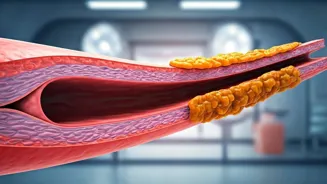Embrace Heart-Healthy Foods
Dietary choices significantly impact arterial health, and adopting a heart-conscious eating plan is essential. Embrace foods abundant in fiber, antioxidants,
and omega-3 fatty acids to assist in cleansing your arteries. Fiber-rich foods like oats, apples, and beans are excellent choices because they bind with cholesterol in the digestive tract, preventing its absorption. Antioxidants, found in colorful fruits and vegetables such as berries, spinach, and kale, combat inflammation and protect against arterial damage. Including omega-3-rich options such as salmon and flaxseeds can further support the health of your arteries. These fats have anti-inflammatory properties and help prevent plaque formation. Gradually incorporating these foods into your regular meals will help to support the natural cleansing process in your arteries, leading to better heart health.
Boost Physical Activity
Regular physical activity plays a significant role in arterial health. Engaging in consistent exercise helps improve blood circulation, reducing plaque buildup within the arteries. Activities that elevate your heart rate, like brisk walking, jogging, swimming, or cycling, offer the most benefits. Aim for at least 150 minutes of moderate-intensity or 75 minutes of vigorous-intensity aerobic exercise each week. Beyond improving heart health, physical activity supports weight management, lowers blood pressure, and enhances cholesterol levels. Consistency is key; try incorporating exercise into your daily routine to cultivate a sustainable habit. Start slowly if you're a beginner, and gradually increase the intensity and duration. Before beginning any new exercise routine, consult your doctor, especially if you have existing health conditions. Proper exercise can be a powerful tool in safeguarding arterial health and promoting overall cardiovascular fitness.
Prioritize Stress Reduction
Chronic stress is a silent culprit that can damage your arteries, elevating blood pressure and increasing inflammation. Effectively managing stress can thus contribute positively to arterial health. Techniques such as meditation, deep breathing exercises, and yoga are excellent choices for mitigating stress. Dedicate a few minutes each day to these activities to cultivate a calm and focused state of mind. Besides these techniques, activities you enjoy, like spending time in nature, pursuing hobbies, or socializing with loved ones, can reduce stress levels. Try incorporating mindfulness practices into your daily routine, which helps you stay present and focused. Consider setting boundaries to protect your time and energy, which will allow you to reduce unnecessary stressors. When your mind is at peace, your body is less susceptible to the negative effects of stress, paving the way for healthier arteries and better heart function.
Quit Smoking for Good
Smoking is notoriously detrimental to arterial health, leading to severe harm that accelerates plaque formation. The chemicals in cigarettes cause damage to the arterial walls, triggering inflammation and increasing the risk of blood clots. The most effective action you can take to cleanse your arteries is to quit smoking completely. If you smoke, seek professional assistance to stop. Your doctor can recommend cessation aids, such as nicotine replacement therapy, medications, or behavioral counseling, to help you manage withdrawal symptoms and stay on track. Support groups or online communities also can offer valuable encouragement and strategies. Once you quit smoking, your body begins repairing itself. Within days, your blood pressure and heart rate will start to normalize. Over time, the risk of heart disease, stroke, and other smoking-related illnesses decreases significantly. Taking this one decisive step is a major step towards a healthier cardiovascular system.
Stay Hydrated Daily
Proper hydration is essential for overall health, including the maintenance of healthy arteries. Water helps to keep your blood flowing efficiently, preventing it from becoming too thick and potentially forming clots. Dehydration can lead to several health complications that could indirectly affect arterial health. Aim to drink sufficient water throughout the day; the exact amount can vary based on factors like activity level, climate, and overall health. Monitor your urine color; pale yellow usually indicates good hydration. Include water-rich foods, like fruits and vegetables, in your diet to complement your water intake. Avoid sugary drinks, as they can contribute to weight gain and inflammation. Staying hydrated supports optimal bodily functions, promoting healthy arteries and maintaining good health. Making conscious hydration a daily priority is a simple yet important way to invest in your cardiovascular health.



















